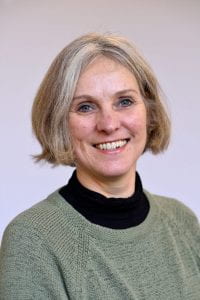
As part of the University of Bristol’s #BristolUniWomen campaign to mark International Women’s Day 2021, we’re spotlighting women from the School for Policy Studies who have been using their expertise to tackle the pandemic by carrying out world-class research.
Karen West, Professor of Social Policy and Ageing, has been looking at the impact of the Covid-19 pandemic on bereavement in retirement communities.
1. Your research has focussed on the impact the Covid-19 pandemic on bereavement in retirement communities. Could you tell us a little more?
We have been working with the ExtraCare Charitable Trust and Cruse Bereavement Care for three years now on a project that is about developing a volunteer peer bereavement support programme and general ‘grief literacy’ for staff and residents in the retirement villages run by the Trust. When the pandemic came, we weren’t able to continue the face to face field work that we had planned. On the other hand, Covid presented us with an opportunity to try out some different methods of data collection and we applied for funding from the Elizabeth Blackwell Institute to collect diaries of the experience of supporting people through bereavement. This turned out to be a great method for gaining the kind of real-time insight into the work and thoughts of the volunteers that we hadn’t really been able to capture before. We learned a lot about the challenges that people are facing when they have limited connection to the support of families and friends and when funerals and memorial events are very restricted. On the other hand, we also learned that for many who are grieving, lockdown brings a kind of relief at not having to put on a smile and a brave face every day and to be able to manage sorrow at their own pace. We also learned how the residents had been really creative in organising their own social-distanced memorial events.
2. What have been the biggest challenges or triumphs for you during the pandemic?
The biggest challenge has been that of all researchers who do ethnographic field work – not being able to face to face field work. On the other hand, we’ve learned to be creative in developing other methods. This is also true of another Covid project on collaborative housing (funded by NIHR SSCR) that I have worked on. Above all, I feel so lucky to have been able to work with excellent teams of researchers. Our regular Zoom meetings have really given a shape and purpose to my working week that I may not have had otherwise. Oddly, I think my working with relationships with these colleagues has strengthened during the pandemic.
You can read about the projects here:


